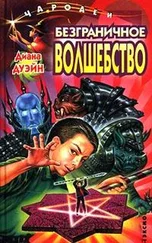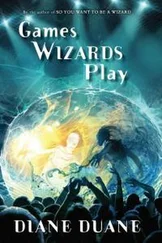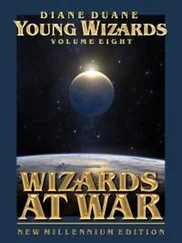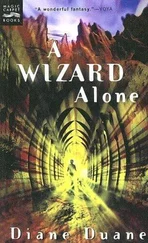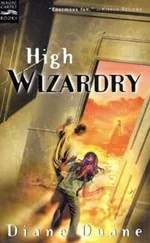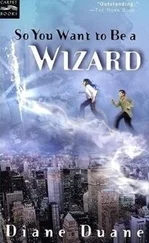Диана Дуэйн - Wizard's Holiday
Здесь есть возможность читать онлайн «Диана Дуэйн - Wizard's Holiday» весь текст электронной книги совершенно бесплатно (целиком полную версию без сокращений). В некоторых случаях можно слушать аудио, скачать через торрент в формате fb2 и присутствует краткое содержание. Жанр: Фэнтези, на английском языке. Описание произведения, (предисловие) а так же отзывы посетителей доступны на портале библиотеки ЛибКат.
- Название:Wizard's Holiday
- Автор:
- Жанр:
- Год:неизвестен
- ISBN:нет данных
- Рейтинг книги:5 / 5. Голосов: 1
-
Избранное:Добавить в избранное
- Отзывы:
-
Ваша оценка:
- 100
- 1
- 2
- 3
- 4
- 5
Wizard's Holiday: краткое содержание, описание и аннотация
Предлагаем к чтению аннотацию, описание, краткое содержание или предисловие (зависит от того, что написал сам автор книги «Wizard's Holiday»). Если вы не нашли необходимую информацию о книге — напишите в комментариях, мы постараемся отыскать её.
Wizard's Holiday — читать онлайн бесплатно полную книгу (весь текст) целиком
Ниже представлен текст книги, разбитый по страницам. Система сохранения места последней прочитанной страницы, позволяет с удобством читать онлайн бесплатно книгу «Wizard's Holiday», без необходимости каждый раз заново искать на чём Вы остановились. Поставьте закладку, и сможете в любой момент перейти на страницу, на которой закончили чтение.
Интервал:
Закладка:
breathe. It’s just me…
Nita knew perfectly well that the apparent flatness of her home planet was an illusion. She had seen, on the Moon, the unexpected curvature of a body much smaller than the Earth, so that the horizon seemed cramped and close, and things a mile or so away seemed much too near. What she saw now was the opposite of that. Things that seemed far away would turn out to be farther still. Those mountains towering up against the edge of things were even farther away. And that was the problem. It shouldn’t be possible to be under a sky and still see things that were so far away, against a horizon that left you feeling you were at the bottom of a huge, shallow bowl, with all that blue sky pooling on top of you, pouring onto you like water, pressing you down
It’s just big, Nita thought. Just the size of the planet makes it seem this way. But it was too big. And something else about it seized her by the heart and squeezed, so that she was almost having trouble breathing.
Why do I know this place? Nita thought. What does this remind me of?
“Neets?” Kit said to her. “Neets, are you all right?”
She swallowed. “Yeah,” she said. “How about you?”
“Uh, yeah.”
She glanced over at Kit. He looked a little pale but seemed otherwise all right. “But how can it be this big?” she said. “How can anything be this big? And do you feel it—”
“There you are! Sorry I’m late,” someone said from behind them. “Dai stihó, cousins. Welcome to Alaalu!”
Arrivals Dairine stood outside the back door, glancing occasionally at her watch and waiting.
Even before she’d been a wizard, waiting had been tough for her. Nothing happens fast enough—that had been the most basic motto of her short life. When she’d become a wizard, at first Dairine had thought that that would be the end of waiting, at last—that everything would begin happening at a speed that would suit her, and that the world would finally start working. Now, looking back at that early time, she had to laugh at herself. Dairine had discovered the hard way that even becoming a practitioner of the Art that sourced its power from the magic at the heart of the universe was no guarantee of protection against bureaucracy, accident, or failed expectations. Entropy was running, and in an environment conditioned by the never-ending battle against that ancient enemy and its inventor, not even wizardry could necessarily make your wishes come true.
There were other compensations, of course. On her Ordeal and after it, she had seen things that few other human beings have been privileged to see. She had watched the Sun rise through Saturn’s rings, heard spring thunder in Jupiter’s atmosphere, watched distant galaxies rise over alien landscapes; she had even officiated at the birth of a species. But none of these experiences had gone very far to make her any more patient. Maybe when I’m older, she thought. By the time I’m
twenty I’ll probably have it licked.
It wasn’t licked yet, though. Dairine looked at her watch again. It’s ten after three, she thought. Where are these people?
Beside her, on the step, Spot sat and looked at the sunny spring afternoon with a much calmer attitude than Dairine. Probably gate-traffic congestion, he said.
Behind the thought came the usual background that Dairine heard when she and Spot were communicating: a sort of stream-of-machine-consciousness, a trinary roar, seething with background thought that sounded like distant surf. The background thought was both Spot’s and that of the far-distant wizardly machine intelligence to which Dairine was a sort of godmother, and with which she had been affiliated since passing her Ordeal. Sometimes that distant activity of mind, half manual, half living thing, looked out through Dairine’s eyes and lived with her at what it considered an incredibly leisurely pace, thinking thoughts in whole seconds rather than in milliseconds; but mostly it went about its own business at its own speed, a blur of thought of which only the high points emerged in Dairine’s consciousness. Now, in that mode, Spot said, It’s not as if they’re using a private gating complex. There may be delays at the other end—
“Yeah,” Dairine said. She sat on the step again—this was probably the fourth or fifth time she’d stood and sat down—and picked Spot up. “Let me see that briefing pack again.”
Spot obligingly flipped up his screen and went into “wizard’s manual” mode. On the screen appeared Dairine’s version, in the Speech, of the briefing pack that the Powers That Be, or their administrative assistants, had sent her dad. Dairine had read it through once last night, mostly with an eye to seeing how good the translation was. Even considering the source, she was concerned that a Speech-to-text utility couldn’t be perfect. There were words in the Speech that simply didn’t go into English, and Dairine had wanted to make sure there wasn’t anything in her dad’s version of the briefing that he was going to misconstrue. To her relief, though, the material had been translated as perfectly as could have been expected, the translation being more a simplification than anything else.
Each of the visitors had his—or its—own page in the package. There were 3-D “live” pictures of them embedded in the briefing pack, though even in manual-based documents there was never any guarantee that the image would be an exact rendition of any being’s state or likeness when it actually arrived. But even if the documentation hadn’t exactly and accurately portrayed them, they were still, to put it mildly, a mixed bunch. The Rirhait was more like a giant metallic purple centipede than anything else; one of twenty-four of its parents’ first brood hatched out, very newly become a wizard—within the past Rirhait year, which was about two Earth years. It was interested enough in other worlds and other scholia of wizardry to have applied for this excursus almost as soon as it hit post-Ordeal status. “It” was probably incorrect: Sker’ret (that being the part of his name that Dairine could most easily pronounce, the rest being all consonants) was more or less a “he.”
She keyed ahead to the next page. All of the visitors, in fact, were “he”s, though with the next one, it was hard to say exactly what made him that way. Maybe it’s the berries, Dairine thought, studying his picture. Filifermanhathrhumneits’elhhessaiffnth was his whole name, a word that to Dairine
sounded oddly like wind in branches—and that was probably appropriate because he was a tree. If there are trees that walk, Dairine thought. But, plainly, on his world, Demisiv, there were…though walking probably wasn’t the right word for it. They got around, anyway, and could be surprisingly mobile when they needed to be. As far as Dairine could tell from the manual’s description of the Demisiv people, they spent all their lives wading around through the ground, and the whole surface of their sealess planet was one great migratory forest, with mighty bands of trees rooting only briefly and then getting on the move again, hunting other skies to grow under, new ground to grow in. Maybe the concept of a tree with wanderlust isn’t so weird, Dairine thought as she studied Filif’s image, which looked rather like a Christmas tree with red berries. His whole people seem to have it, in a way. He’s just wandering farther than usual…
She keyed ahead to the last page in the info packet and looked at it rather speculatively. “Roshaun ke Nelaid (am Seriv am Teliuyve am Meseph am Veliz…) det Wellakhit,” said the entry beside the live image of someone who was obviously humanoid. Good thing Neets isn’t here, Dairine thought, studying that picture one more time, because he’s really hot.
The manual gave only a head shot unless you requested another view of a subject, and right then Dairine didn’t bother. Roshaun-and-all-the-rest-of-the-names was handsome, almost perfectly so—and it was the disbelief in his apparent perfection that kept Dairine looking at him rather longer than she intended. He had a long, fair-skinned face with a very thoughtful expression. This was partially concealed by surprisingly long, blond hair, most of which was tied behind his head, but he also had very long bangs, which he was probably always pushing out of his eyes, and a long lock of hair hanging down in front of each ear. The eyes were a startling green, a shade not normally achieved on Earth without the assistance of contact lenses.
Читать дальшеИнтервал:
Закладка:
Похожие книги на «Wizard's Holiday»
Представляем Вашему вниманию похожие книги на «Wizard's Holiday» списком для выбора. Мы отобрали схожую по названию и смыслу литературу в надежде предоставить читателям больше вариантов отыскать новые, интересные, ещё непрочитанные произведения.
Обсуждение, отзывы о книге «Wizard's Holiday» и просто собственные мнения читателей. Оставьте ваши комментарии, напишите, что Вы думаете о произведении, его смысле или главных героях. Укажите что конкретно понравилось, а что нет, и почему Вы так считаете.

